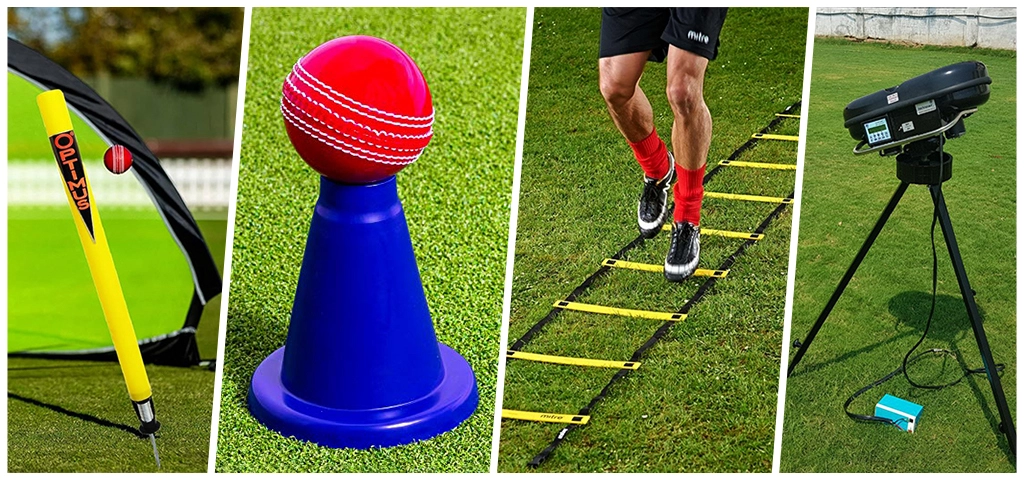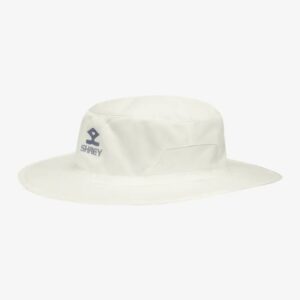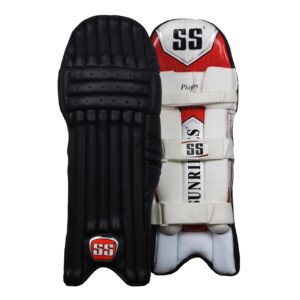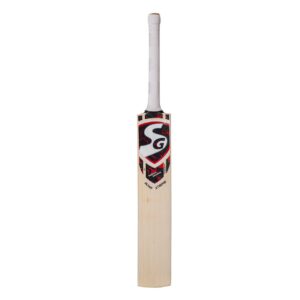Practicing regularly is the key to becoming a better cricketer. Whether you are a beginner or a professional, using the right cricket practice tools can make a huge difference in improving your skills. From batting to bowling and fielding, there are various cricket practice equipment designed to help players sharpen their techniques and build confidence.
In this blog, we’ll explore a detailed cricket accessories list, discuss their importance, and share some personal insights on how to use them effectively.
What are Cricket Practice Tools?
Cricket Practice Tools are specialized equipment designed to help cricketers improve various aspects of their game, including batting, bowling, and fielding. These tools are essential for structured and efficient practice sessions, enabling players to work on specific skills and techniques in a controlled environment.
Why Are They Important?
Using practice tools in cricket is essential because they allow players to focus on specific skills and improve faster. With the right tools, players can work on accuracy, timing, and speed, which all lead to better performance on the field.
1. Cricket Balls

One of the most important items in any cricket equipment name list is the cricket ball. Different types of balls are used for practice, such as:
- Leather Balls: For advanced practice and match-like conditions.
- Tennis Balls: Ideal for beginners and casual practice.
- Rubber Balls: Great for indoor practice and drills.
- Wind Balls: Perfect for safe batting practice without worrying about injuries.
Personal Tip: Always use the right type of ball based on your practice goals. For serious practice, leather balls are the best, but for beginners, tennis or wind balls are more suitable.
2. Cricket Bats

A cricket bat is the most vital cricket instrument for a batsman. When selecting a bat, make sure it suits your playing style and comfort level.
- English Willow Bats: Used by professional players for superior performance.
- Kashmir Willow Bats: Affordable and durable, ideal for beginners.
- Training Bats: Specifically designed for improving shot timing and strength.
Pro Tip: Keep a separate bat for practice sessions to avoid unnecessary wear and tear on your match bat.
3. Batting Tees and Stumps
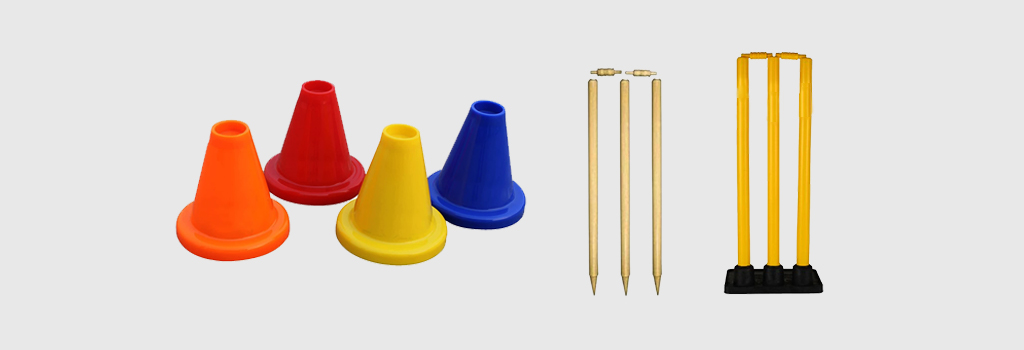
Batting tees help in improving shot placement and hand-eye coordination. They are especially useful for young cricketers learning to play straight drives and lofted shots.
Stumps are essential for practicing accurate shots and bowling. You can find different types of stumps, including wooden and plastic ones.
4. Bowling Machines

Bowling machines are excellent cricket practice tools for batsmen who want to practice against consistent deliveries at various speeds and lengths.
Why Use a Bowling Machine?
- Helps in practicing different types of deliveries (bouncers, yorkers, full-length balls).
- Allows batsmen to face high-speed balls repeatedly.
Personal Experience: I have used bowling machines extensively during my playing days, and they helped me improve my reflexes and shot selection against fast bowlers.
5. Fielding Training Aids

Good fielding can change the outcome of a match. To become a sharp fielder, you need proper cricket sport equipment like:
- Catching Mitts: To practice high and fast catches.
- Rebound Nets: Helps improve reflexes by simulating unpredictable ball returns.
- Flat Markers and Cones: Used for fielding drills and improving agility.
Pro Tip: Regularly practice using rebound nets to enhance your catching and throwing accuracy.
6. Protective Gear
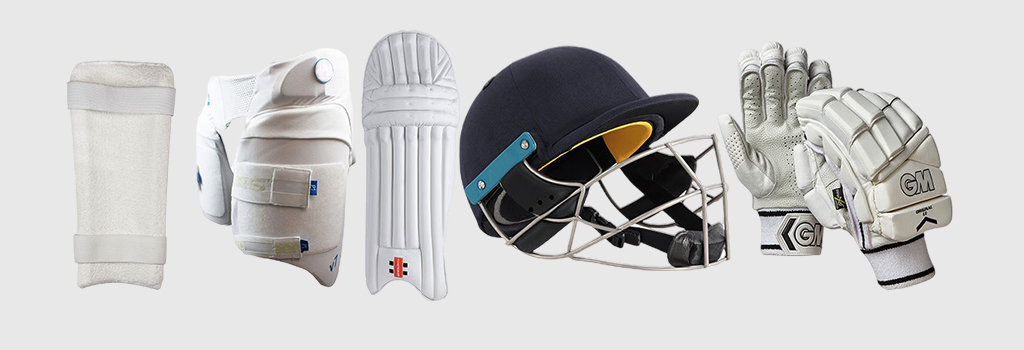
Safety is crucial during cricket practice. Protective gear ensures that players can practice confidently without the fear of injuries. Essential protective cricket equipment includes:
- Helmets
- Batting pads
- Gloves
- Abdominal guards
- Elbow guards
Make sure your protective gear fits well and is of high quality to ensure maximum safety.
7. Training Aids for Fitness

Cricket is a physically demanding sport. To improve your overall fitness and endurance, you can include the following training aids:
- Resistance bands
- Medicine balls
- Skipping ropes
- Agility ladders
Personal Advice: Fitness is just as important as skill in cricket. Regular use of fitness equipment will enhance your stamina and speed, making you a better all-round player.
8. Throwdown Sticks

Throwdown sticks are handheld tools used by coaches to deliver fast, accurate throws to batsmen. They help in improving shot timing and footwork against quick deliveries.
9. Cricket Nets
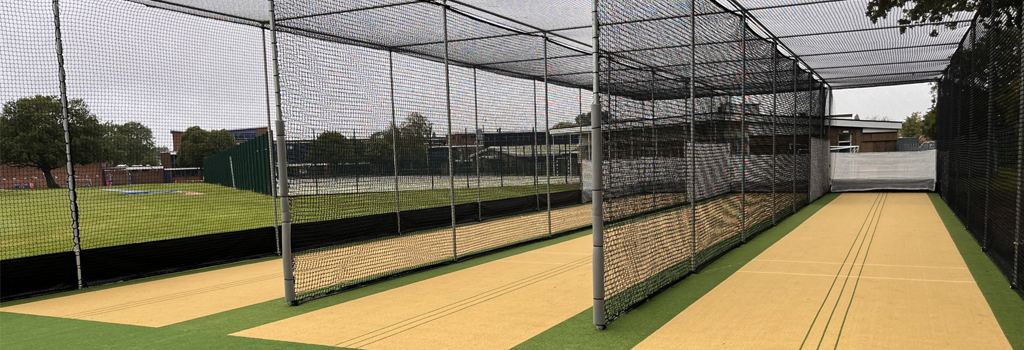
No cricket practice equipment list is complete without cricket nets. Practicing within nets allows players to focus on their batting, bowling, and fielding without interruptions.
Tip: If you practice regularly, consider setting up a cricket net in your backyard or local ground.
10. Scoreboards and Marking Tools

Although not used directly in practice, portable scoreboards and marking tools are essential for match simulations during practice sessions. They help players get used to match pressure and scoring patterns.
Conclusion
Using the right cricket practice tools and cricket sport equipment can help players develop their skills faster and more effectively. From choosing the correct ball to using advanced aids like bowling machines and rebound nets, every tool plays a crucial role in a player’s journey.
As someone who has spent years playing and coaching cricket, I can vouch for the importance of these tools. Whether you’re just starting or aiming to become a professional, investing in quality cricket practice equipment is always worth it. So, gear up, practice hard, and enjoy the beautiful game of cricket!
Buy Cricket Practice Gear Online- DP Azad Sports
Looking to upgrade your cricket practice gear? Shop the best cricket practice tools and top equipment online at DP Azad Sports. Whether you’re a beginner or a professional, we have everything you need to take your game to the next level. Browse through our extensive collection of cricket balls, bats, nets, and fitness aids. Don’t miss out on high-quality cricket gear—gear up like a pro today!
(FAQs)
What are the essential cricket practice tools for beginners?
A: Beginners should start with tennis balls, a lightweight bat, stumps, and protective gear like helmets and gloves. These basic tools help in building confidence and improving hand-eye coordination.
Why is using proper cricket practice equipment important?
A: Proper equipment ensures safety, enhances performance, and helps players practice efficiently. Using the right tools allows players to focus on specific skills such as batting, bowling, and fielding.
Which cricket practice tools are best for improving batting skills?
A: Bowling machines, throwdown sticks, and batting tees are great tools for enhancing batting skills. Practicing with different types of balls also helps improve shot timing and technique.
How can I improve my fielding skills?
A: Using fielding aids like rebound nets, catching mitts, and flat markers can help improve reflexes, catching accuracy, and agility.
Where can I buy high-quality cricket practice equipment?
You can find top-quality cricket practice tools and equipment at DP Azad Sports, known for their wide range of cricket gear at competitive prices.

